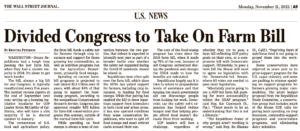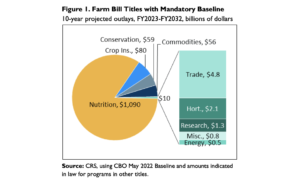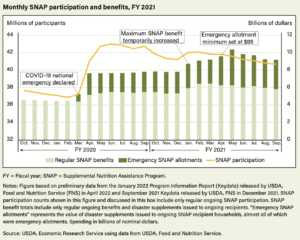The Agriculture Department has finalized some revisions to two major farm commodity programs, including rules for adding new base acres, but signup for the programs won’t be scheduled until after…
Farm Bill Passage, “About to Get Much Harder”
Kristina Peterson reported in today’s Wall Street Journal that, “House Republicans had a tough time passing the last farm bill, when they had a sizable majority in 2018. It’s about to get much harder.
“The bill, always a big lift for any Congress, is typically reauthorized every five years. The current version expires at the end of September next year, setting up a looming legislative headache for GOP Leader Kevin McCarthy of California, who will have a slim majority if he is elected speaker in January.

“The cornerstone of U.S. food and agriculture policy, the farm bill funds a safety net for farmers through crop insurance and support for those growing key commodities, as well as nutrition programs run by the Agriculture Department, primarily food stamps.”
Peterson explained that, “Spending on current farm bill programs is projected to cost almost $1.3 trillion over 10 years, with about 84% of that going to support the food-stamp program, according to the nonpartisan Congressional Research Service, which noted that the cost estimates will be adjusted later this year. Congress also approved roughly $20 billion for farm bill conservation programs this summer, outside of the normal farm bill cycle.

“While spending on food stamps is always a bone of contention between the two parties, that debate is expected to intensify next year as part of a broader battle over whether the safety net expanded during the Covid-19 pandemic should be reined in.”

Today’s article noted that, “Republicans largely say that it is time to return to prepandemic levels of assistance and that keeping too much government aid can discourage people from looking for work.
“Democrats say that the safety net’s expansion has helped reduce hunger and that helping people afford food doesn’t dissuade them from working.”

The Journal article added that, “Rep. Frank Lucas (R., Okla.), a former Agriculture Committee chair, said a bipartisan farm bill always has to fend off efforts from conservative and liberal groups that could derail the coalition holding it together.
“‘We just have to fight our way through it,’ he said.”
Meanwhile, Reuters writer Leah Douglas reported on Friday that, “U.S. President Joe Biden’s pledges to slash emissions from farming and to end American hunger by 2030 may be harder to realize now that Republicans flipped the House of Representatives with a thin majority.
“Biden’s Democrats, who retain control of the Senate, will start negotiating in the coming months with Republican House leaders over a massive farm spending bill passed every five years that funds U.S. public food benefits and farm commodity programs.”
Douglas pointed out that, “The House agriculture committee will likely be led starting in January by Glenn ‘GT’ Thompson of Pennsylvania. A staffer for Thompson said his main goal is to get the bill passed and he does not yet have clear policy priorities. In past remarks, he has criticized U.S. Department of Agriculture (USDA) spending on climate programs, and supported restrictions on hunger benefits.”
The Reuters article noted that, “At an April agriculture committee hearing on the SNAP program, Thompson expressed support for tightening work requirements for benefit recipients. But Jim McGovern, a Democrat on the House farm committee, told Reuters any cuts to SNAP or changes to work requirements ‘will result in a farm bill not getting done, period.’
“In September, at the first hunger conference of its kind in half a century, Biden pledged to end hunger by 2030. Many of the strategies he laid out would require Congressional action, but there was little Republican participation in the conference, which Thompson called a ‘political stunt.'”
Douglas added that, “Hearings discussing the farm bill are underway, but negotiations are behind where they typically would be at this point in the farm bill cycle, in part because of Congressional priorities on other legislation, said Mike Lavender, interim policy director at the National Sustainable Agriculture Coalition, a farm policy group.
“‘It’s going to be a crunch,’ he said.”





